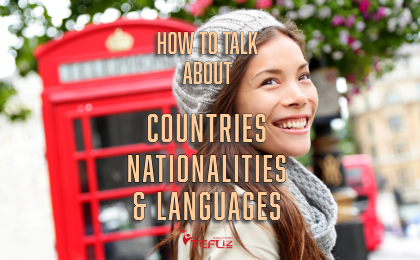How to Talk about Countries, Nationalities, and Languages
One very useful bit of knowledge for ESL Learners is how to say the nationalities and languages of different countries. When we speak about a country, we refer to it by its name, such as “France.” The people from that country are called by their nationality, for example, “French.” Interestingly, the language spoken usually shares the name with the nationality, so in France, the people speak “French.”
Here’s a simple structure you can use:
- Country: This is the place or nation, like “Japan.”
- Nationality: This describes the people from that country, for example, “Japanese.”
- Language: Often the same as the nationality, this is the primary language spoken, such as “Japanese.”
Now, let’s dive into a table outlining the top 25 countries, organized by their name, nationality, and language spoken. This guide will serve as a practical resource in your ESL journey.
The World in a Glance: Countries, Nationalities, and Languages
| Country | Nationality | Main Language Spoken |
|---|---|---|
| Australia | Australian | English |
| Brazil | Brazilian | Portuguese |
| Canada | Canadian | English, French |
| China | Chinese | Mandarin |
| Egypt | Egyptian | Arabic |
| France | French | French |
| Germany | German | German |
| India | Indian | Hindi, English |
| Indonesia | Indonesian | Indonesian |
| Italy | Italian | Italian |
| Japan | Japanese | Japanese |
| Mexico | Mexican | Spanish |
| Netherlands | Dutch | Dutch |
| Nigeria | Nigerian | English |
| Pakistan | Pakistani | Urdu, English |
| Philippines | Filipino | Filipino, English |
| Russia | Russian | Russian |
| Saudi Arabia | Saudi | Arabic |
| South Africa | South African | English, Afrikaans |
| South Korea | South Korean | Korean |
| Spain | Spanish | Spanish |
| Thailand | Thai | Thai |
| Turkey | Turkish | Turkish |
| United Kingdom | British | English |
| United States | American | English |
Our Global World
Understanding the countries of the world, their people, and the languages they speak is not just about expanding our linguistic capabilities; it’s about opening our minds to the vast, colorful spectrum of human culture. For ESL learners, this knowledge is a powerful tool in the journey towards fluency and global citizenship. Embrace this learning, and let it enrich your conversations, your studies, and your appreciation of the beautiful diversity of our world.

